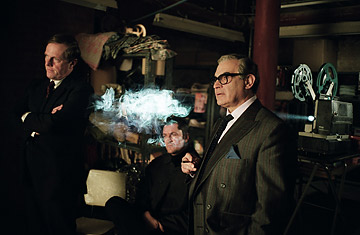
The Bank Job
In 1971 some yeggs tunneled into a Lloyd's Bank on the corner of Baker St and the the Marylebone Road in London, helped themselves to the contents of its safe deposit vault and skeddadled with cash and jewelry worth something like 3 million pounds. The robbery preoccupied the front pages of the English press for four days, then abruptly disappeared from the newspapers when the government clamped a "D Notice" on the story — implying that evidence of state secrets was also part of the swag.
Some of the money was eventually recovered, but, curiously enough, much of the other property went unclaimed, lending credence to the rumor that the vault also contained a lot of dirty little secrets. This much of The Bank Job's story is true. But since to this day no one knows who perpetrated the crime or what their motives were, director Roger Donaldson and screenwriters Dick Clement and Ian La Frenais have had to make up most of their tale. On the whole, they've made a pretty good job of it. For example, they posit the scandalous possibility that pictures of Princess Margaret, engaging in a threesome on a Caribbean island have been stored in one of the boxes by a real-life villain named Michael X, a drug dealer posing as a black power advocate. He's using the snaps to protect himself from crown prosecution. There are also pictures of establishment figures caught in flagrante in a bondage brothel and a ledger recording the payoffs made to the police by a porn kingpin. The movie plays the robbery as a kind of sting, arranged by MI 5, a branch of the British secret service. Their idea was to make the crime look like a standard heist, allow the robbers to keep the loot if they could escape the investigating cops, but grab the embarrassing evidence of royal playfulness. To this end, they engage the astonishingly beautiful Martine (Saffron Burrows) to recruit the crime team — a bunch of small time crooks (led by the excellent Jason Statham, who is on his way to broody stardom) from her old lower class neighborhood. This is the film's central irony: in a sense they are its innocents, working stiffs who are unaware — until very late in the film — that they are being used by the guys with the posh accents and bespoke tailoring to do their dirty work for them.
The money is everything to the "rude mechanicals," nothing to the swells and our rooting interest is all with the former. This makes The Bank Job an entertaining study in class consciousness. It also benefits, I think, from the fact that it is so low tech. No cell phones, no computers, no mysterious electronic gizmos to help them. The robbery is all sweaty stoop labor and it is most suspensefully threatened when a nearby ham radio operator picks up walkie talkie transmissions between a dim-witted lookout and the diggers in the tunnel. There has been an attempt to position this movie as something rather light and larkish. But, believe me, it is not The Lavender Hill Mob Redux.
There is not a lot of scintillating dialogue in The Bank Job, but there are plenty of kinky sexual allusions and it includes a torture sequence about as brutal as anything you're likely to see in the movies these days. The only major laugh line is supplied by Lord Mountbatten, that grandest of all modern courtiers. Recruited as a kind of bag man for the secret service, he receives the nasty photograph of the Princess, with the blithest of comments: "She always was a scalawag." But this picture is not after comedy, it is aiming for larger ironies. And delivers them effectively in the context of fast-paced and gripping crime drama.
